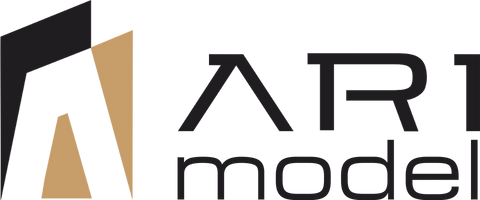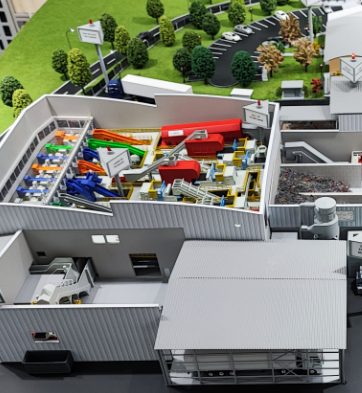The Industrial Model Creation Process
Why Industrial Models Are So Important to Engineering and Manufacturing
Industrial models are a crucial tool in engineering, manufacturing, and infrastructure development, allowing businesses to visualize, analyze, and optimize complex projects. These models act as scaled-down representations of large industrial systems, simplifying processes such as:
-
Testing and optimizing product designs before mass production
-
Improving communication between engineers, investors, and stakeholders
-
Preventing manufacturing defects by identifying potential problems early
-
Enhancing factory layout and production process efficiency
For over 20 years, ARI Model has been the preferred partner for businesses needing high-precision industrial models for engineering research, factory simulations, and product development. Our expertise ensures that every model is accurate, functional, and built to industry standards.
Learn more about industrial model-making at ARI Model
Key Steps in the Industrial Model-Making Process
1. Understanding Client Requirements and Project Specifications
The industrial model-making process begins with a detailed consultation between the client and ARI Model’s expert team. During this phase, we:
-
Define the model’s purpose (e.g., product prototype, factory simulation, investor presentation)
-
Gather technical data, including blueprints, CAD drawings, and engineering specifications
-
Discuss materials, scale, and interactive features required for the model
-
Plan the budget and timeline to ensure timely project delivery
This initial stage is crucial for ensuring accuracy and functionality, as every industrial model must precisely reflect real-world applications.
2. 3D Modeling and Digital Prototyping
Once the project details are finalized, ARI Model creates a 3D digital prototype using CAD software such as:
-
AutoCAD – for technical drawings and blueprint conversions
-
SolidWorks – for mechanical engineering and product design models
-
Rhino 3D – for architectural and infrastructure-related models
This digital modeling phase allows our engineers to identify structural issues, test design feasibility, and make adjustments before physical fabrication begins.
Discover more about CAD modeling on Wikipedia
3. Material Selection for Industrial Models
Selecting the right materials is key to creating a durable and functional industrial model. At ARI Model, we use:
-
Acrylic and polycarbonate plastics – for transparency and lightweight durability
-
High-density foam board – for structural support in architectural and factory models
-
Metallic components (aluminum, steel, brass) – for mechanical prototypes requiring structural integrity
-
3D-printed materials – for intricate details and rapid prototyping
Each industrial model is custom-built using a combination of these materials, ensuring both aesthetic appeal and long-term durability.
4. Precision Fabrication and Assembly
The fabrication process at ARI Model integrates traditional craftsmanship with cutting-edge technology, ensuring every model meets the highest standards of detail and precision. Our techniques include:
-
3D Printing – for creating complex, high-detail components with extreme accuracy
-
CNC Machining – for high-precision cuts and engravings on plastic, metal, and composite materials
-
Laser Cutting – for creating intricate details in factory layouts and mechanical models
-
Hand Assembly and Finishing – to refine details and add realistic textures and colors
By combining automation and expert hand-finishing, ARI Model ensures that each industrial model is highly functional and visually realistic.
5. Testing, Quality Control, and Client Review
Before an industrial model is finalized, ARI Model conducts rigorous testing and quality control procedures to:
-
Ensure dimensional accuracy through precision measurement tools
-
Verify structural stability by simulating real-world conditions
-
Test interactive features like movable parts, lighting, and modular sections
-
Incorporate client feedback to make final refinements
This quality assurance phase guarantees that every ARI Model industrial model meets the highest industry standards and client expectations.
Industries That Benefit from Industrial Model-Making
Manufacturing and Factory Planning
-
Optimize factory layouts and machinery placement
-
Simulate production workflows to improve efficiency
-
Minimize risks in large-scale production setups
Engineering and Research Prototyping
-
Test mechanical components in a controlled environment
-
Reduce production costs by identifying design flaws early
-
Enhance collaboration between engineers and designers
Aerospace and Automotive Development
-
Improve aerodynamics and mechanical functionality testing
-
Showcase vehicle prototypes at trade shows and investor meetings
-
Validate safety features before mass production
Urban Planning and Smart Cities
-
Develop models for infrastructure, transportation, and energy solutions
-
Facilitate public engagement and city planning approvals
-
Create sustainable urban designs with interactive models
With expertise across multiple industries, ARI Model provides customized industrial models to meet the unique needs of each project.
Why Choose ARI Model for Industrial Model-Making?
With over 20 years of experience, ARI Model has built a reputation as an industry leader in precision model-making. We specialize in tailor-made industrial models, offering:
-
✅ High-precision prototypes for engineering, manufacturing, and research
-
✅ Advanced fabrication techniques, including 3D printing, CNC machining, and laser cutting
-
✅ Custom-built models tailored to industry-specific applications
-
✅ Fast turnaround times and reliable quality assurance
-
✅ Trusted by leading corporations, engineers, and research institutions worldwide





